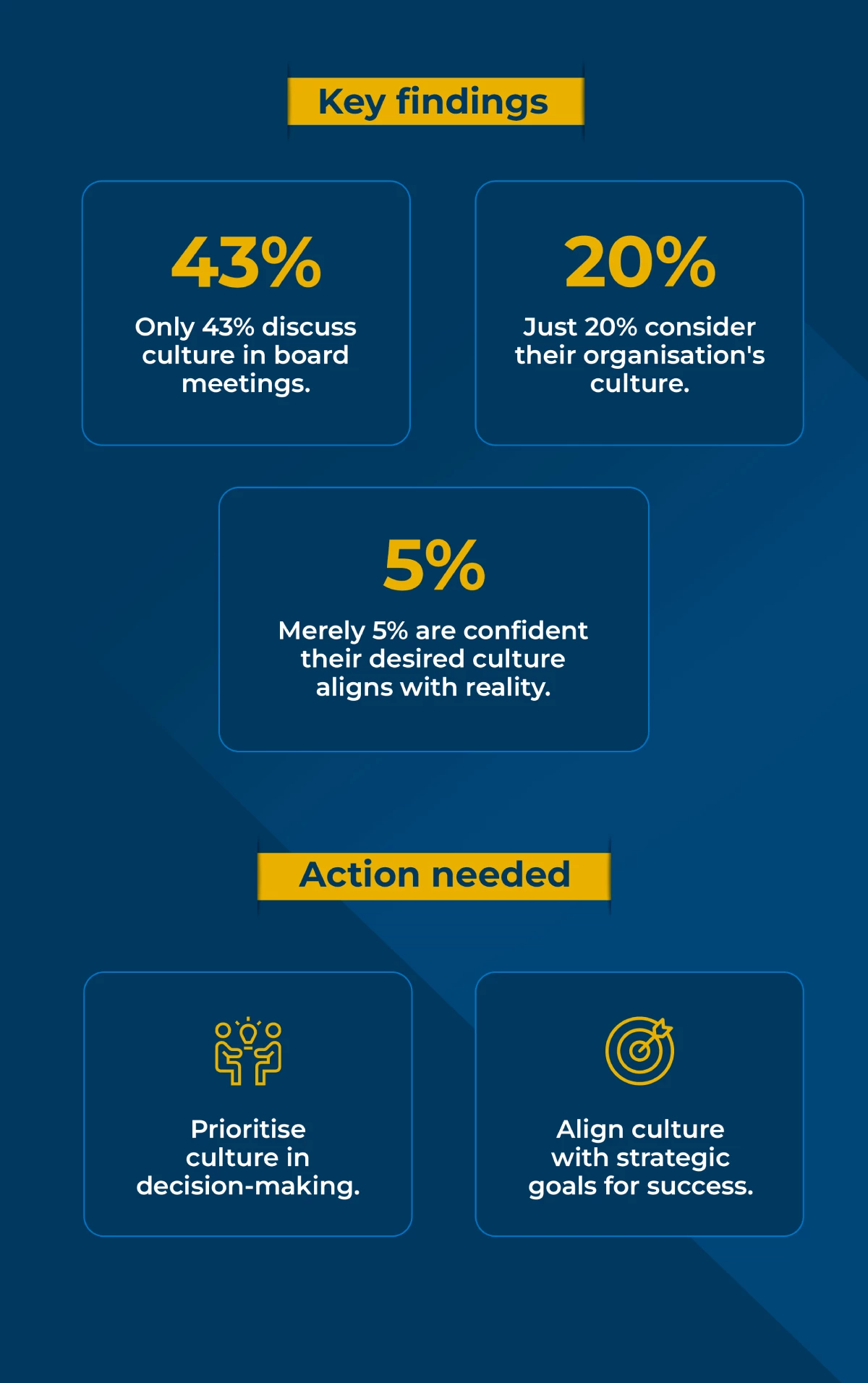Key findings:
- Only 43% discuss culture in board meetings.
- Just 20% consider their organisation's culture.
- Merely 5% are confident their desired culture aligns with reality.
Action needed:
- Prioritise culture in decision-making.
- Align culture with strategic goals for success.
Without paying attention to organisational culture, workplaces can become chaotic. With a lack of people management, plans lack direction and inefficient communication can get in the way of goals.
By following these steps, companies can create a united and goal-focused workplace that helps them reach their main objectives.
Describing organisational culture is key to success
Defining the organisational culture and making sure everyone knows about it are really important first steps in matching culture with strategy. To do this, you need to figure out the values, beliefs and ways of doing things that support the organisational culture. It's crucial to make these things clear and easy for everyone to understand because otherwise, they just stay as ideas in your head.
But it's not as easy as just writing down some values and putting them on the walls. That might help a bit, but what really matters is everyone’s behaviour. Organisational culture is basically how the leaders act – how they communicate, how they solve problems and so on. These aspects get passed on to everyone else and have a big impact on how well the organisation performs overall.
Set effective communication as a primary objective
Ineffective communication can prevent an organisation’s success. When employees don't have the right information, they can't finish their tasks, learn new skills, or help the company succeed in the long run.
Proper communication brings people together for a common goal and is a key to success. It breaks down cultural differences, reduces conflicts at work and encourages teamwork.
To align culture with strategy, good communication is crucial. Ways to achieve this include open discussions and being honest in all communications. Companies that understand the obstacles to efficient communication can create strategies that break down barriers and keep everyone on the same page, helping to align culture with strategy.
Consider aligning your values with your vision
If your values don't match your goals, your business strategy is likely to fail.
The management needs to know what the company believes in and these beliefs should guide its goals. It's important to advise the employees about organisational values. If they don't know what the organisation stands for, how can they help achieve the organisation’s goals?
Take a fresh look at the organisation’s mission statement
Align organisational culture and strategy through mission statement. Make it a story that leaders and managers can share with teams. This story should talk about the company's values and beliefs and show how everyone helps achieve the company's goals. Make it so clear that employees can imagine it and feel a part of it and remind them to keep this mission in mind in everything they do.
Employee engagement is a key to success
How engaged employees are directly affects how well they and the company will perform. It affects how easily the employees are hired; how much work gets done, how long individuals stay with the company and how much profit the company makes.
Employees who are committed to the organisation’s goals really care about the company and how others perceive it. They feel a strong connection to the company they work for and their work feels important.
Employee engagement isn't something a business can ignore and neither is the need to align culture with strategy. By focusing on these important areas, leaders like you can create a culture that fits with the company's goals, leading to better performance and satisfied employees.
Learn about organisational culture with Global Banking School (GBS)
GBS is a well-known higher education institution in the UK, known for its specialist courses in fields such as finance, business, healthcare and more. With a wide presence in major UK cities, the institution is dedicated to its mission of “changing lives through education”.
GBS strives to support its students in succeeding in today's tough job market. It provides strong connections to employers and emphasises personalised academic and career guidance alongside specialised courses. The institution adopts an inclusive approach to student recruitment, seeking to increase access to higher education for groups that are currently under-represented in the field.
GBS offers BA (Hons) Business and Management Progression Route (Level 6 Top-up) for students who want to understand organisational culture to help their businesses grow or want to become business professionals who want to create a difference.
BA (Hons) Business and Management Progression Route (Level 6 Top-up)
Modern companies are seeking business professionals who not only possess relevant knowledge and skills but are also prepared to join their teams and make an impact. This one-year degree completion course will enhance your business knowledge and practical skills, allowing you to upgrade your HND to a full bachelor's degree.
Upon completing this degree, you'll be equipped and qualified to tackle the challenges of today's workplaces. Throughout this level 6 course, you'll deepen your understanding of modern business theory and practice. You'll receive ample opportunities and support to hone the essential skills necessary for success in the business world.
The course modules will cover vital concepts in organisational strategy, leadership and management. Practical assignments and assessments will mirror real-world scenarios, such as pitching, presenting, reporting, group management and project leadership.
You'll acquire valuable skills and knowledge applicable across various sectors. With this degree, your career prospects will be diverse, ranging from positions in large corporations to small businesses, both in the private and public sectors and even opportunities for entrepreneurship.

 Make a call
Make a call
 Prospectus
Prospectus
 Email
Email
 Whatsapp
Whatsapp



